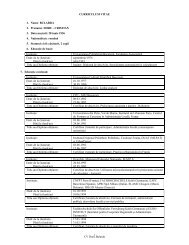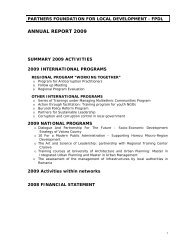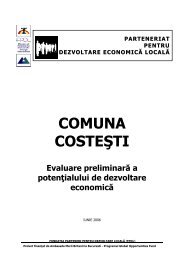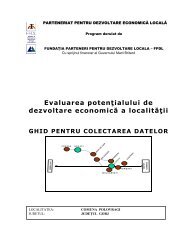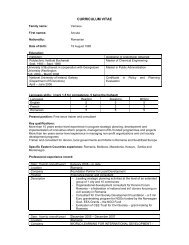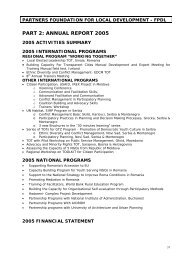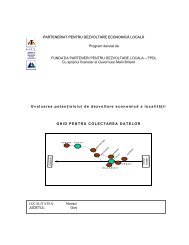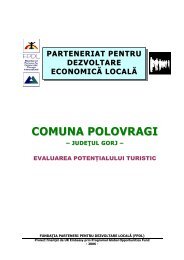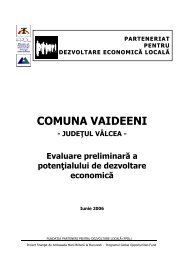Organizational Development: A Manual for Managers and ... - FPDL
Organizational Development: A Manual for Managers and ... - FPDL
Organizational Development: A Manual for Managers and ... - FPDL
Create successful ePaper yourself
Turn your PDF publications into a flip-book with our unique Google optimized e-Paper software.
For example, the objective of the course may be improving negotiation skill. However, to do so<br />
one would need good underst<strong>and</strong>ing of rational decision-making process, co-operative<br />
behavior, have developed communication skills, persuasive speaking, etc.<br />
When working with local governments on the improvement relations between executives <strong>and</strong><br />
politicians, it is not enough <strong>and</strong> effective just to give usual course on team building or something<br />
like that. Preliminary lecture explaining the nature of local democracy <strong>and</strong> basic principles of<br />
interrelations between councilors <strong>and</strong> officers, may be also some domestic legislation, is<br />
needed. It may be also useful to include some exercises in problem identification, policy<br />
making, <strong>and</strong> goals setting.<br />
At the beginning of the course, it is often helpful to give participants some ideas about<br />
emotional <strong>and</strong> assertive behavior. It facilitates removing barriers <strong>and</strong> preventing conflicts.<br />
At the end of many training courses, it may be very useful to talk about strategic management,<br />
organization culture, managing change, <strong>and</strong> develop corresponding action plans, although<br />
action planning may be not seen as objective at the beginning of the process.<br />
Successful intervention in practice requires a complex set of relevant skills. Partial improvement<br />
of one given skill may be sufficient, if all other skills of the complex are already acquired. If not –<br />
corresponding items should be included in the program. It creates additional problems with the<br />
training in transitional countries. There may be nothing to do in a too short course, but it may be<br />
not possible to have a course of at least 4-5 days, which is usually an optimum <strong>for</strong> the<br />
beginners.<br />
6. Organisation<br />
6.1 PLACE. In any case, it is better <strong>for</strong> training to be organised outside of the working place,<br />
although it is often more costly. Nevertheless, when discussing options it is worth referring to<br />
the objectives of the course. The place itself may be considered as one of key training<br />
resources (like in the case of a study-tour). The place may also provide additional resources<br />
(e.g. in some training courses organised by UNCHS-Habitat, domestic local authorities have<br />
been used as object <strong>for</strong> consultancy by trainees).<br />
Our experience in managing training courses <strong>for</strong> local governments in Lithuania, Ukraine, <strong>and</strong><br />
Russia unambiguously state, that training in host premises <strong>for</strong> top managerial personnel<br />
always creates problems, which rarely may be justified by the savings in costs. It is better to<br />
have really effective training <strong>for</strong> the total price of 20% more (travelling <strong>and</strong> logistic facilities in<br />
CEE are not very expensive, especially <strong>for</strong> local administration bodies).<br />
6.2. TIME. Training process needs relevant time not in term of quantity only, but also in term of<br />
quality. Formally, certain topics in regular programme may require certain amount of time,<br />
203



